Analyzing Coca Cola's Economic Contributions in Bulgaria
VerifiedAdded on 2023/03/17
|6
|1460
|62
Report
AI Summary
This report provides a comprehensive analysis of the economic impact of Coca-Cola in Bulgaria. It begins with an introduction to Coca-Cola and the principles of demand and supply, setting the stage for an examination of the company's influence within the Bulgarian market. The report details Coca-Cola's operations in Bulgaria, including its subsidiary, production plants, and financial contributions. It then delves into the value-added effect, quantifying the company's contribution to the country's GDP, tax revenues, and support for local suppliers. The report further explores the employment effect, highlighting the number of jobs directly and indirectly supported by Coca-Cola's activities. The conclusion summarizes the firm's significant economic impact, emphasizing its contribution to GDP, tax payments, and job creation within the Bulgarian economy. References to relevant academic sources support the analysis.
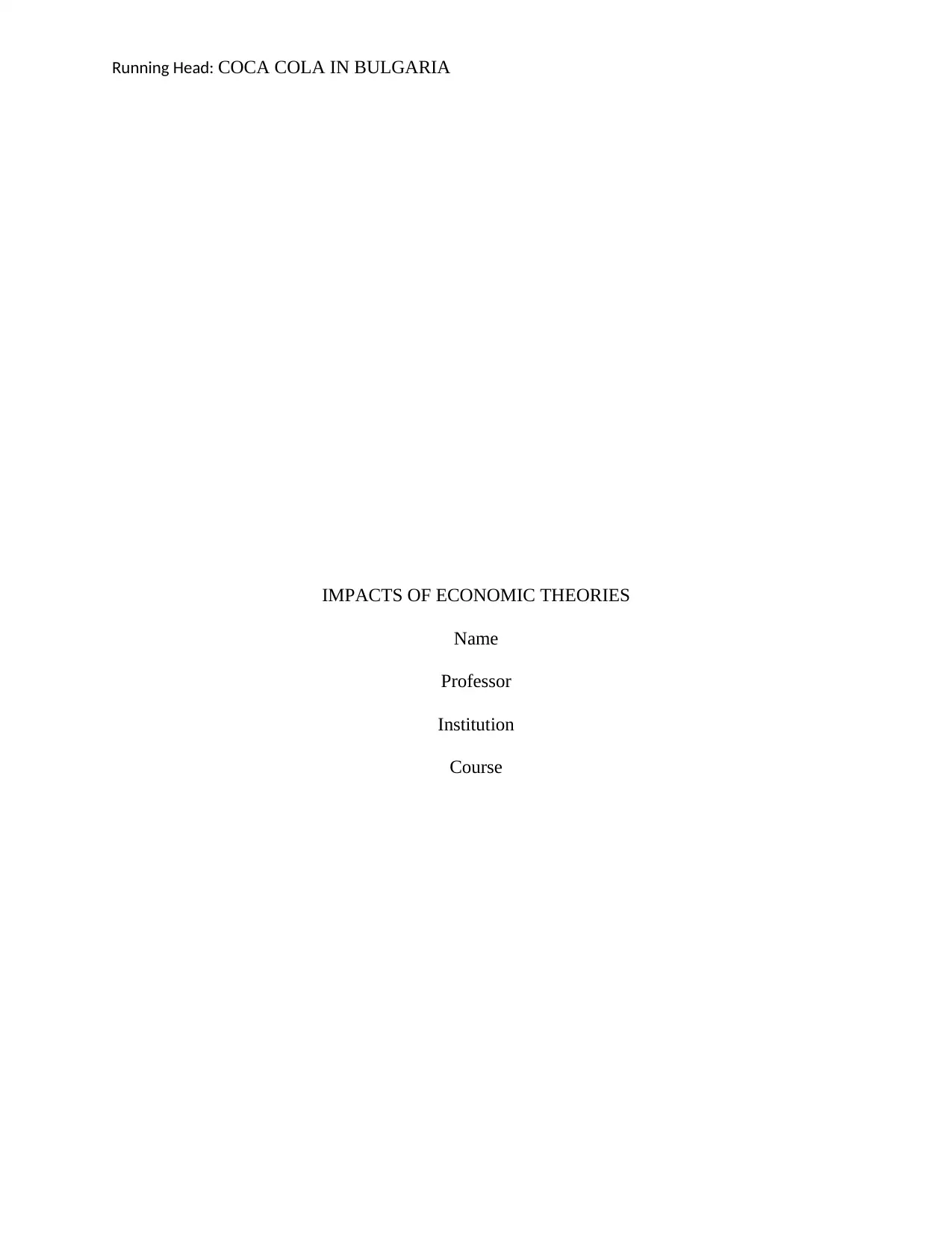
Running Head: COCA COLA IN BULGARIA
IMPACTS OF ECONOMIC THEORIES
Name
Professor
Institution
Course
IMPACTS OF ECONOMIC THEORIES
Name
Professor
Institution
Course
Paraphrase This Document
Need a fresh take? Get an instant paraphrase of this document with our AI Paraphraser
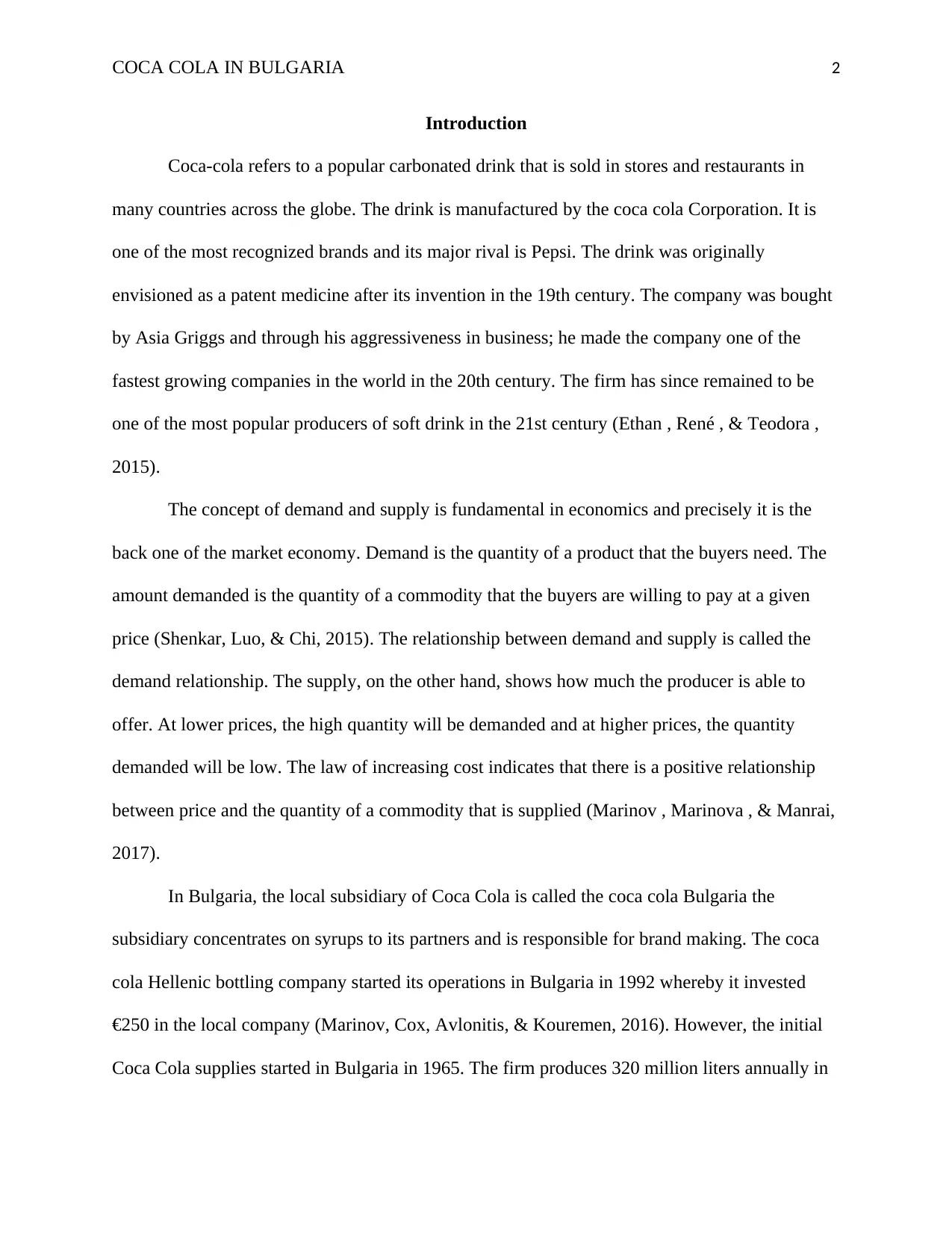
COCA COLA IN BULGARIA 2
Introduction
Coca-cola refers to a popular carbonated drink that is sold in stores and restaurants in
many countries across the globe. The drink is manufactured by the coca cola Corporation. It is
one of the most recognized brands and its major rival is Pepsi. The drink was originally
envisioned as a patent medicine after its invention in the 19th century. The company was bought
by Asia Griggs and through his aggressiveness in business; he made the company one of the
fastest growing companies in the world in the 20th century. The firm has since remained to be
one of the most popular producers of soft drink in the 21st century (Ethan , René , & Teodora ,
2015).
The concept of demand and supply is fundamental in economics and precisely it is the
back one of the market economy. Demand is the quantity of a product that the buyers need. The
amount demanded is the quantity of a commodity that the buyers are willing to pay at a given
price (Shenkar, Luo, & Chi, 2015). The relationship between demand and supply is called the
demand relationship. The supply, on the other hand, shows how much the producer is able to
offer. At lower prices, the high quantity will be demanded and at higher prices, the quantity
demanded will be low. The law of increasing cost indicates that there is a positive relationship
between price and the quantity of a commodity that is supplied (Marinov , Marinova , & Manrai,
2017).
In Bulgaria, the local subsidiary of Coca Cola is called the coca cola Bulgaria the
subsidiary concentrates on syrups to its partners and is responsible for brand making. The coca
cola Hellenic bottling company started its operations in Bulgaria in 1992 whereby it invested
€250 in the local company (Marinov, Cox, Avlonitis, & Kouremen, 2016). However, the initial
Coca Cola supplies started in Bulgaria in 1965. The firm produces 320 million liters annually in
Introduction
Coca-cola refers to a popular carbonated drink that is sold in stores and restaurants in
many countries across the globe. The drink is manufactured by the coca cola Corporation. It is
one of the most recognized brands and its major rival is Pepsi. The drink was originally
envisioned as a patent medicine after its invention in the 19th century. The company was bought
by Asia Griggs and through his aggressiveness in business; he made the company one of the
fastest growing companies in the world in the 20th century. The firm has since remained to be
one of the most popular producers of soft drink in the 21st century (Ethan , René , & Teodora ,
2015).
The concept of demand and supply is fundamental in economics and precisely it is the
back one of the market economy. Demand is the quantity of a product that the buyers need. The
amount demanded is the quantity of a commodity that the buyers are willing to pay at a given
price (Shenkar, Luo, & Chi, 2015). The relationship between demand and supply is called the
demand relationship. The supply, on the other hand, shows how much the producer is able to
offer. At lower prices, the high quantity will be demanded and at higher prices, the quantity
demanded will be low. The law of increasing cost indicates that there is a positive relationship
between price and the quantity of a commodity that is supplied (Marinov , Marinova , & Manrai,
2017).
In Bulgaria, the local subsidiary of Coca Cola is called the coca cola Bulgaria the
subsidiary concentrates on syrups to its partners and is responsible for brand making. The coca
cola Hellenic bottling company started its operations in Bulgaria in 1992 whereby it invested
€250 in the local company (Marinov, Cox, Avlonitis, & Kouremen, 2016). However, the initial
Coca Cola supplies started in Bulgaria in 1965. The firm produces 320 million liters annually in
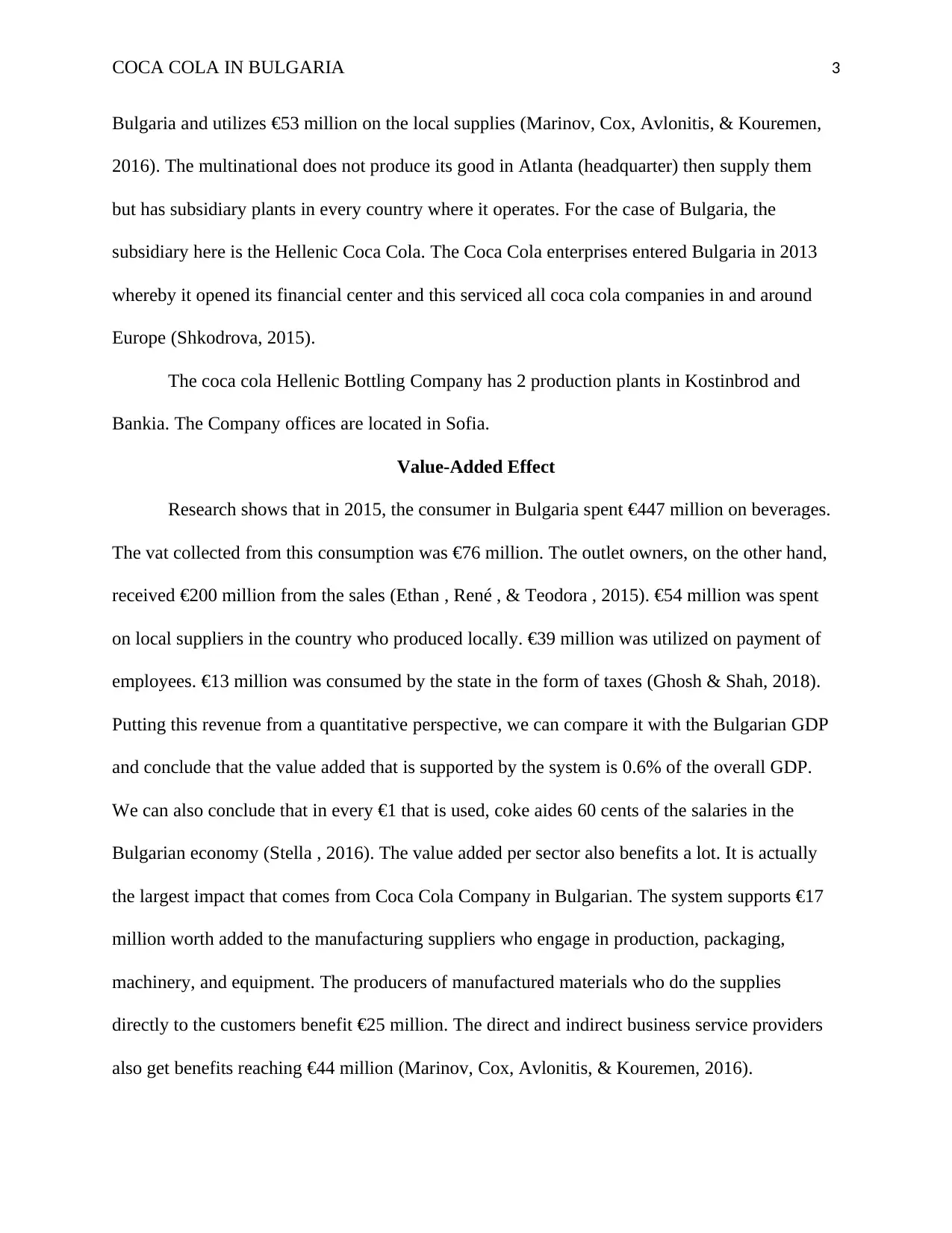
COCA COLA IN BULGARIA 3
Bulgaria and utilizes €53 million on the local supplies (Marinov, Cox, Avlonitis, & Kouremen,
2016). The multinational does not produce its good in Atlanta (headquarter) then supply them
but has subsidiary plants in every country where it operates. For the case of Bulgaria, the
subsidiary here is the Hellenic Coca Cola. The Coca Cola enterprises entered Bulgaria in 2013
whereby it opened its financial center and this serviced all coca cola companies in and around
Europe (Shkodrova, 2015).
The coca cola Hellenic Bottling Company has 2 production plants in Kostinbrod and
Bankia. The Company offices are located in Sofia.
Value-Added Effect
Research shows that in 2015, the consumer in Bulgaria spent €447 million on beverages.
The vat collected from this consumption was €76 million. The outlet owners, on the other hand,
received €200 million from the sales (Ethan , René , & Teodora , 2015). €54 million was spent
on local suppliers in the country who produced locally. €39 million was utilized on payment of
employees. €13 million was consumed by the state in the form of taxes (Ghosh & Shah, 2018).
Putting this revenue from a quantitative perspective, we can compare it with the Bulgarian GDP
and conclude that the value added that is supported by the system is 0.6% of the overall GDP.
We can also conclude that in every €1 that is used, coke aides 60 cents of the salaries in the
Bulgarian economy (Stella , 2016). The value added per sector also benefits a lot. It is actually
the largest impact that comes from Coca Cola Company in Bulgarian. The system supports €17
million worth added to the manufacturing suppliers who engage in production, packaging,
machinery, and equipment. The producers of manufactured materials who do the supplies
directly to the customers benefit €25 million. The direct and indirect business service providers
also get benefits reaching €44 million (Marinov, Cox, Avlonitis, & Kouremen, 2016).
Bulgaria and utilizes €53 million on the local supplies (Marinov, Cox, Avlonitis, & Kouremen,
2016). The multinational does not produce its good in Atlanta (headquarter) then supply them
but has subsidiary plants in every country where it operates. For the case of Bulgaria, the
subsidiary here is the Hellenic Coca Cola. The Coca Cola enterprises entered Bulgaria in 2013
whereby it opened its financial center and this serviced all coca cola companies in and around
Europe (Shkodrova, 2015).
The coca cola Hellenic Bottling Company has 2 production plants in Kostinbrod and
Bankia. The Company offices are located in Sofia.
Value-Added Effect
Research shows that in 2015, the consumer in Bulgaria spent €447 million on beverages.
The vat collected from this consumption was €76 million. The outlet owners, on the other hand,
received €200 million from the sales (Ethan , René , & Teodora , 2015). €54 million was spent
on local suppliers in the country who produced locally. €39 million was utilized on payment of
employees. €13 million was consumed by the state in the form of taxes (Ghosh & Shah, 2018).
Putting this revenue from a quantitative perspective, we can compare it with the Bulgarian GDP
and conclude that the value added that is supported by the system is 0.6% of the overall GDP.
We can also conclude that in every €1 that is used, coke aides 60 cents of the salaries in the
Bulgarian economy (Stella , 2016). The value added per sector also benefits a lot. It is actually
the largest impact that comes from Coca Cola Company in Bulgarian. The system supports €17
million worth added to the manufacturing suppliers who engage in production, packaging,
machinery, and equipment. The producers of manufactured materials who do the supplies
directly to the customers benefit €25 million. The direct and indirect business service providers
also get benefits reaching €44 million (Marinov, Cox, Avlonitis, & Kouremen, 2016).
⊘ This is a preview!⊘
Do you want full access?
Subscribe today to unlock all pages.

Trusted by 1+ million students worldwide
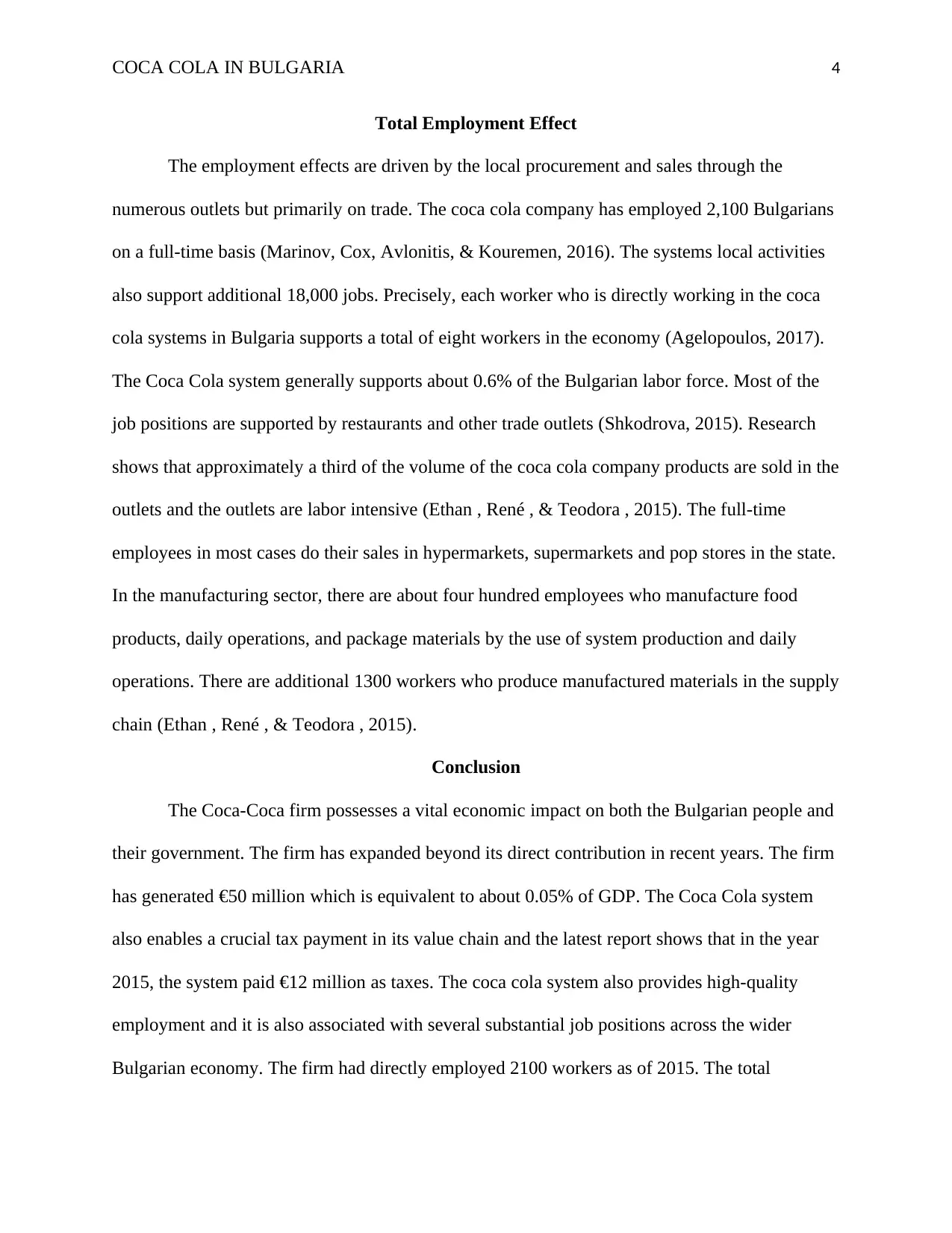
COCA COLA IN BULGARIA 4
Total Employment Effect
The employment effects are driven by the local procurement and sales through the
numerous outlets but primarily on trade. The coca cola company has employed 2,100 Bulgarians
on a full-time basis (Marinov, Cox, Avlonitis, & Kouremen, 2016). The systems local activities
also support additional 18,000 jobs. Precisely, each worker who is directly working in the coca
cola systems in Bulgaria supports a total of eight workers in the economy (Agelopoulos, 2017).
The Coca Cola system generally supports about 0.6% of the Bulgarian labor force. Most of the
job positions are supported by restaurants and other trade outlets (Shkodrova, 2015). Research
shows that approximately a third of the volume of the coca cola company products are sold in the
outlets and the outlets are labor intensive (Ethan , René , & Teodora , 2015). The full-time
employees in most cases do their sales in hypermarkets, supermarkets and pop stores in the state.
In the manufacturing sector, there are about four hundred employees who manufacture food
products, daily operations, and package materials by the use of system production and daily
operations. There are additional 1300 workers who produce manufactured materials in the supply
chain (Ethan , René , & Teodora , 2015).
Conclusion
The Coca-Coca firm possesses a vital economic impact on both the Bulgarian people and
their government. The firm has expanded beyond its direct contribution in recent years. The firm
has generated €50 million which is equivalent to about 0.05% of GDP. The Coca Cola system
also enables a crucial tax payment in its value chain and the latest report shows that in the year
2015, the system paid €12 million as taxes. The coca cola system also provides high-quality
employment and it is also associated with several substantial job positions across the wider
Bulgarian economy. The firm had directly employed 2100 workers as of 2015. The total
Total Employment Effect
The employment effects are driven by the local procurement and sales through the
numerous outlets but primarily on trade. The coca cola company has employed 2,100 Bulgarians
on a full-time basis (Marinov, Cox, Avlonitis, & Kouremen, 2016). The systems local activities
also support additional 18,000 jobs. Precisely, each worker who is directly working in the coca
cola systems in Bulgaria supports a total of eight workers in the economy (Agelopoulos, 2017).
The Coca Cola system generally supports about 0.6% of the Bulgarian labor force. Most of the
job positions are supported by restaurants and other trade outlets (Shkodrova, 2015). Research
shows that approximately a third of the volume of the coca cola company products are sold in the
outlets and the outlets are labor intensive (Ethan , René , & Teodora , 2015). The full-time
employees in most cases do their sales in hypermarkets, supermarkets and pop stores in the state.
In the manufacturing sector, there are about four hundred employees who manufacture food
products, daily operations, and package materials by the use of system production and daily
operations. There are additional 1300 workers who produce manufactured materials in the supply
chain (Ethan , René , & Teodora , 2015).
Conclusion
The Coca-Coca firm possesses a vital economic impact on both the Bulgarian people and
their government. The firm has expanded beyond its direct contribution in recent years. The firm
has generated €50 million which is equivalent to about 0.05% of GDP. The Coca Cola system
also enables a crucial tax payment in its value chain and the latest report shows that in the year
2015, the system paid €12 million as taxes. The coca cola system also provides high-quality
employment and it is also associated with several substantial job positions across the wider
Bulgarian economy. The firm had directly employed 2100 workers as of 2015. The total
Paraphrase This Document
Need a fresh take? Get an instant paraphrase of this document with our AI Paraphraser
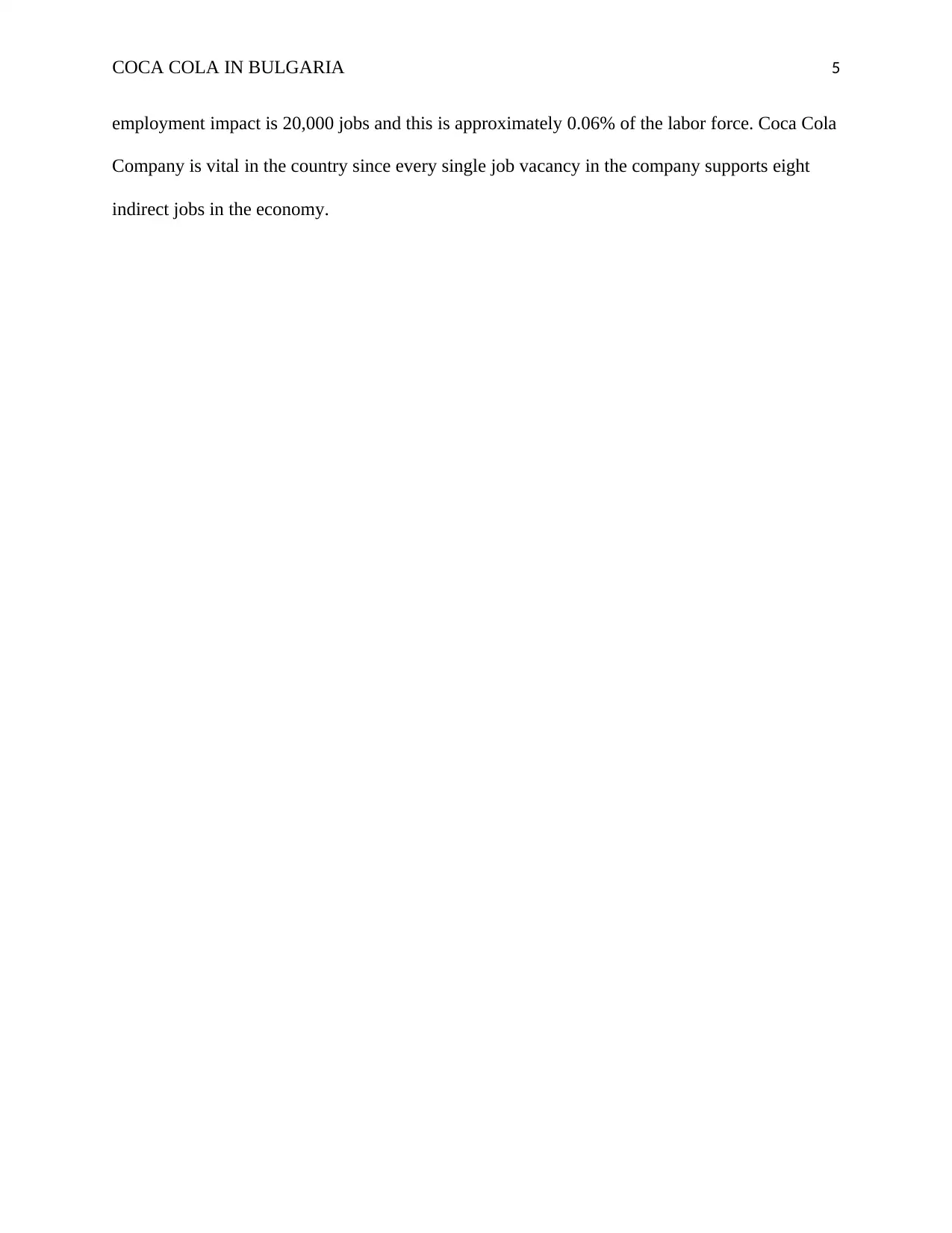
COCA COLA IN BULGARIA 5
employment impact is 20,000 jobs and this is approximately 0.06% of the labor force. Coca Cola
Company is vital in the country since every single job vacancy in the company supports eight
indirect jobs in the economy.
employment impact is 20,000 jobs and this is approximately 0.06% of the labor force. Coca Cola
Company is vital in the country since every single job vacancy in the company supports eight
indirect jobs in the economy.
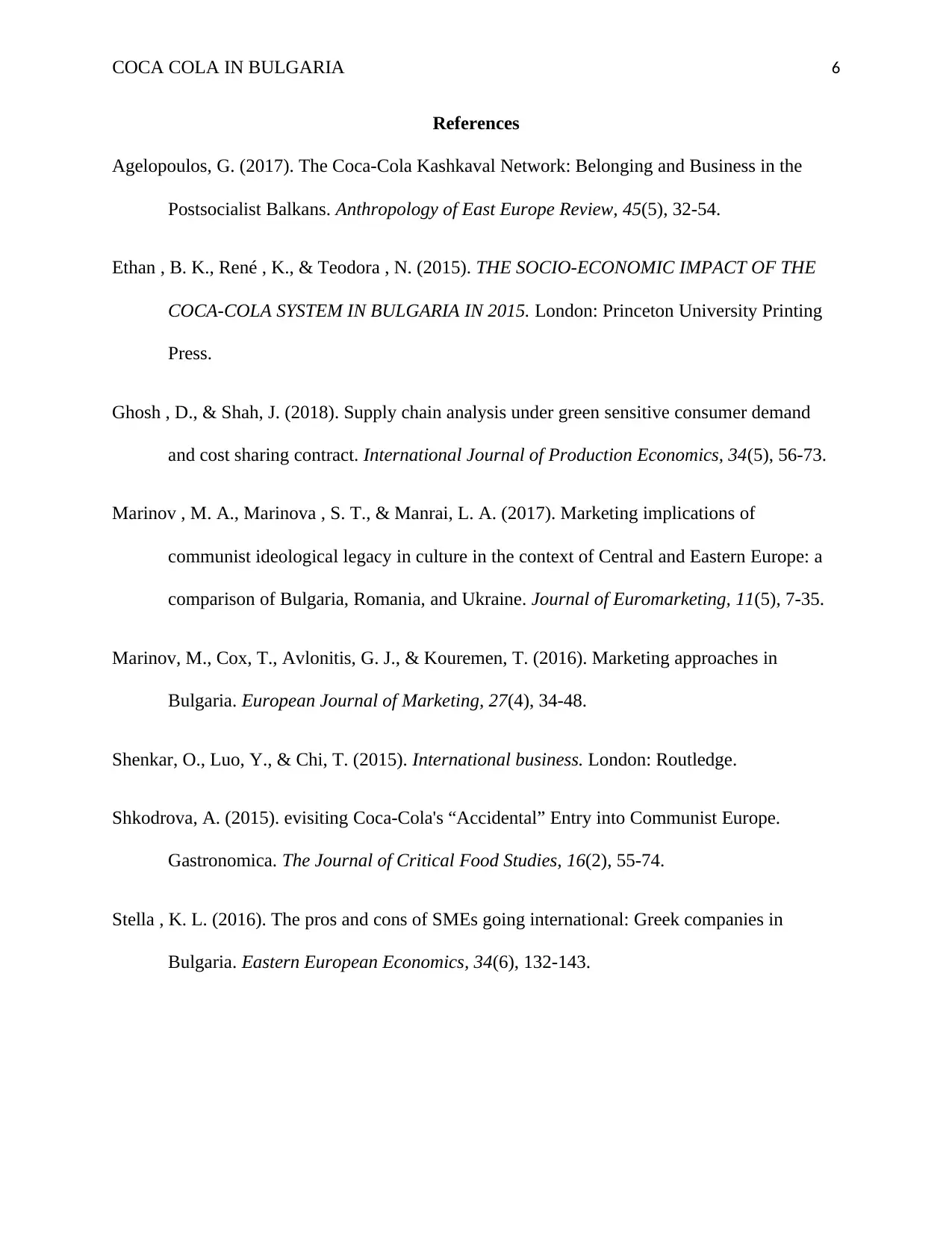
COCA COLA IN BULGARIA 6
References
Agelopoulos, G. (2017). The Coca-Cola Kashkaval Network: Βelonging and Business in the
Postsocialist Balkans. Anthropology of East Europe Review, 45(5), 32-54.
Ethan , B. K., René , K., & Teodora , N. (2015). THE SOCIO-ECONOMIC IMPACT OF THE
COCA-COLA SYSTEM IN BULGARIA IN 2015. London: Princeton University Printing
Press.
Ghosh , D., & Shah, J. (2018). Supply chain analysis under green sensitive consumer demand
and cost sharing contract. International Journal of Production Economics, 34(5), 56-73.
Marinov , M. A., Marinova , S. T., & Manrai, L. A. (2017). Marketing implications of
communist ideological legacy in culture in the context of Central and Eastern Europe: a
comparison of Bulgaria, Romania, and Ukraine. Journal of Euromarketing, 11(5), 7-35.
Marinov, M., Cox, T., Avlonitis, G. J., & Kouremen, T. (2016). Marketing approaches in
Bulgaria. European Journal of Marketing, 27(4), 34-48.
Shenkar, O., Luo, Y., & Chi, T. (2015). International business. London: Routledge.
Shkodrova, A. (2015). evisiting Coca-Cola's “Accidental” Entry into Communist Europe.
Gastronomica. The Journal of Critical Food Studies, 16(2), 55-74.
Stella , K. L. (2016). The pros and cons of SMEs going international: Greek companies in
Bulgaria. Eastern European Economics, 34(6), 132-143.
References
Agelopoulos, G. (2017). The Coca-Cola Kashkaval Network: Βelonging and Business in the
Postsocialist Balkans. Anthropology of East Europe Review, 45(5), 32-54.
Ethan , B. K., René , K., & Teodora , N. (2015). THE SOCIO-ECONOMIC IMPACT OF THE
COCA-COLA SYSTEM IN BULGARIA IN 2015. London: Princeton University Printing
Press.
Ghosh , D., & Shah, J. (2018). Supply chain analysis under green sensitive consumer demand
and cost sharing contract. International Journal of Production Economics, 34(5), 56-73.
Marinov , M. A., Marinova , S. T., & Manrai, L. A. (2017). Marketing implications of
communist ideological legacy in culture in the context of Central and Eastern Europe: a
comparison of Bulgaria, Romania, and Ukraine. Journal of Euromarketing, 11(5), 7-35.
Marinov, M., Cox, T., Avlonitis, G. J., & Kouremen, T. (2016). Marketing approaches in
Bulgaria. European Journal of Marketing, 27(4), 34-48.
Shenkar, O., Luo, Y., & Chi, T. (2015). International business. London: Routledge.
Shkodrova, A. (2015). evisiting Coca-Cola's “Accidental” Entry into Communist Europe.
Gastronomica. The Journal of Critical Food Studies, 16(2), 55-74.
Stella , K. L. (2016). The pros and cons of SMEs going international: Greek companies in
Bulgaria. Eastern European Economics, 34(6), 132-143.
⊘ This is a preview!⊘
Do you want full access?
Subscribe today to unlock all pages.

Trusted by 1+ million students worldwide
1 out of 6
Your All-in-One AI-Powered Toolkit for Academic Success.
+13062052269
info@desklib.com
Available 24*7 on WhatsApp / Email
![[object Object]](/_next/static/media/star-bottom.7253800d.svg)
Unlock your academic potential
Copyright © 2020–2026 A2Z Services. All Rights Reserved. Developed and managed by ZUCOL.